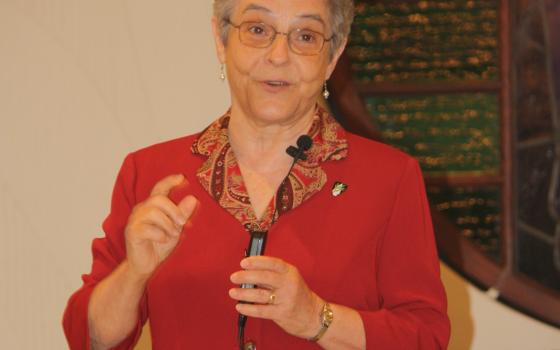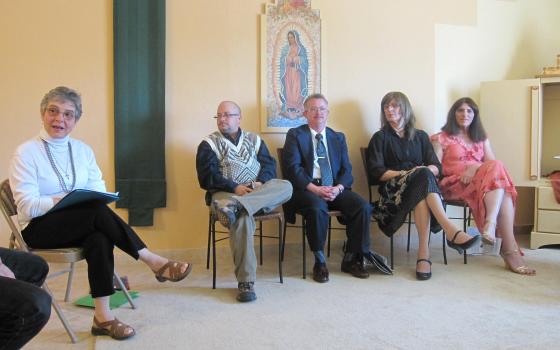Sr. Luisa Derouen is a pioneer in the "T" of LGBT ministry. A few women religious are ministering among transgender people today, but Sister Luisa was the first to do so, as early as 1999, when most Catholics were just coming to understand and accept the "L" and "G."
On several occasions over the years, I met and emailed with Luisa, who is a Dominican Sister of Peace, and have been awed by her ministry on the gender margins. I believe our church needs to honor this valiant and prophetic woman who has shown us how to minister to those who are mostly shunned or even vilified.
Let me tell you a little about Luisa first. She grew up in Welsh, a small town in Louisiana, where her only exposure to religious life was a religious community called the Eucharistic Missionaries of St. Dominic. Her teenage years were every girl's dream, and she was grateful to God and to her family for all the blessings she felt. When she got her driver's license at fifteen, she started going to daily Mass and continued for all four years of high school.
Feeling she could love God more fully through religious life, Luisa decided to enter the small, diocesan congregation at the end of her senior year in 1961. Though there were some very difficult years, Luisa says she has never doubted that religious life is where she belongs.
Luisa served in a variety of ministries: parish ministry, vocation director for her community, coordinator of their motherhouse, spiritual direction, retreat work and liturgical spirituality. After Hurricane Katrina forced her to leave the community's house in New Orleans in 2005, Luisa moved to Tucson, Arizona, where she had once been missioned.
By then Luisa had been diagnosed with a severe degenerative arthritis of the jaw and had to limit talking to alleviate the pain. Because of this condition, she retired from active ministry in 2010 and moved to St. Catherine, Kentucky. By then, her congregation had been in dialogue with seven other Dominican communities that led to the birth a new congregation, the Dominican Sisters of Peace, in 2009.
Here is my conversation with her.
Jeannine: What led you into trans ministry and what does it consist of?
Luisa: When I was ending vocation ministry in 1998, I asked my leadership team if I could minister among the lesbian and gay community as I have gay and lesbian people in my family. The leadership team readily agreed, but required that I remain under the radar. At a PFLAG (Parents, Families and Friends of Lesbians and Gays) meeting, I met Courtney Sharp, a transgender woman who was recovering from gender affirming surgery. I was impressed by how loved and respected she was by all in the group. She said that acknowledging and claiming their truth as transgender is a profoundly spiritual experience for many transgender people, but there are no spiritual leaders who are willing to companion them. This was 1999. She introduced me to other trans folks in New Orleans, and soon I was being contacted by transgender people from other parts of the country.
As a spiritual companion, I have been present to them on the phone, or by Skype and email, in coffeehouses, restaurants and in their homes, at church or guiding a retreat for them. But mostly, I pray for them and let them know I am praying.
I regularly attended transgender support meetings. For several years I facilitated a number of Transgender Awareness Evenings by inviting people to meet my trans friends and hear their stories. I mentored a couple of sisters who now do transgender ministry themselves.
How do trans persons reconcile their faith and their gender identity?
Transgender people who contact me already know and love God, but there is a strong societal and religious message telling them they cannot be transgender and faithful to God at the same time. For example, Dawn was traumatized by two experiences of being harshly judged by priests insisting she was doomed to hell unless she acknowledged that she was a boy and not a girl. Her therapist did not recognize that at the core of Dawn's struggle was the chasm between acknowledging that she was transgender and believing that God still loved her as she was.
Brian and his spouse went to Mass and prayed the rosary together every day. For many years he fought against a persistent knowledge from within himself that he was transgender. Finally he could no longer pretend to be who he wasn't. Because his family had a very difficult time with his transition, he thought that perhaps he should do as Jesus did — choose to die for the sake of those he loved. He was overwhelmed with guilt for their pain and thought it was his fault. He spent many hours with God. He finally came to understand that Jesus didn't choose to take his own life. Jesus loved us to the point of dying and really meant it when he said, "I have come that you may have life, and have it to the full." It is our false self that must die, never our true self.
Sandi and her wife live on the West Coast and are in their mid-forties. They have five children, ranging in age from twenty-one to four, and have always been active in their Catholic parish. After transitioning, Sandi has been totally accepted at her job and even travels internationally with her professional peers. However, her spouse and children largely reject her even though Sandi has shown incredible patience, compassion, forgiveness and boundless love for them. She has been an inspiration to me of what holiness looks like.
Dawn, Brian and Sandi were able to reconcile their faith and their gender identity. Many others cannot and need spiritual companioning. Transgender people have struggled to be honest with themselves, those they love, and with God far more than most people. I'm often struck by the signature line of one of my trans friends, who says, "I'd rather be hated for who I am than loved for who I am not." How many of us can say that "living in our truth" is as important as it is for transgender people?
What has been the response of your community leaders and members to you and your ministry?
My community leaders have always recognized that my ministry is in response to God's call and is totally consistent with our charism and mission statements. I began this ministry with the approval of the Eucharistic Missionaries of St. Dominic and each year following the establishment of our new congregation in 2009 my ministry has been approved by the Dominican Sisters of Peace.
There may be some sisters in my community who don't approve of what I'm doing, but no one has ever said that to me, nor have I heard that from anyone. Over the years, increasing numbers of my sisters have contacted me as a resource for themselves or someone they know, who needs guidance of some kind with a transgender person. The sisters recognize that we all need to learn more about transgender people and stand with them. They have consistently thanked me for leading the way.
Four years ago I read an excellent article about you and your ministry by Nathan Schneider entitled, "A nun's secret ministry brings hope to the transgender community," in which you are identified as "Sister Monica." Why have you used a pseudonym in this ministry for so many years?
While my leadership team always recognized this ministry as a call from God, they knew that the hierarchy does not yet know enough about this reality. If a bishop objected to the ministry, there could be undesirable ramifications for my community and my ministry. In 1999, I was asked not to participate in any publicity at all.
In 2014, as transgender people were becoming more visible, my prioress said that I and others could write about my ministry, without naming myself, my congregation, or the places I had lived. A consistent comment from both supporters and detractors has been "If what she's doing is God's work, why are they hiding?" That is a valid question.
Last year in this country a transgender person was murdered every other week. I am choosing to use my own name now because I feel compelled by God to give fuller witness to the lives of transgender people and to the truth of who I am. Because my talking must be monitored each day, I believe that my "voice" can reach countless people now by writing about the ministry and thus help to smooth the path for transgender people. What's happening to transgender people is the reason I'm coming out now.
I think Pope Francis would commend you. In the first year of his papacy, a transgender woman was found murdered in Rome. Her funeral was held at the Gesu, which is considered the Pope's church in Rome. Pope Francis is urging Catholics to have mercy and also to speak out. So do you consider Pope Francis an ally?
Yes, I do. I'm aware that some people are disappointed because Pope Francis hasn't changed church teaching about sexual and gender matters. I don't expect him to. I consider him an ally because of his posture toward truth.
What's most important for Pope Francis is to engage the person. We're familiar with some of his favorite metaphors for a culture of encounter — the church as a field hospital and the shepherd having the smell of the sheep. Repeatedly he returns to the theme of seeing people as they are, listening to them, having compassion and empathy. This should come before any litmus test of doctrinal orthodoxy if we are to know how to be the presence of Christ for them.
However, Pope Francis, like many people, defaults to the doctrinal approach in instances when he has not had enough experience with people who challenge general beliefs. His experience with transgender people is a good example. He knows Sister Monica Astorga Cremona, the Discalced Carmelite in Argentina, and supports her ministry to transgender women who are trying to end drug use and prostitution. He was sensitive in meeting with a transgender man at the Vatican. But these experiences are not significant enough to withstand the pressure he gets from those who use the phrase "gender ideology" to stir up culture wars. That said, he is willing to learn and to admit when he is wrong. He's a deeply holy man and open to God's Spirit.
Polls and research show that Catholics overwhelmingly support civil rights for lesbian and gay people. In the recent public debate on same-sex marriage, nearly three-quarters of U.S. Catholics were supportive of some kind of legal recognition. Do you think Catholic parishioners are as accepting of transgender people as they are of lesbian and gay people? Do you believe trans issues are getting harder or easier to deal with in our church?
As in most other areas of parish life, how parishioners relate to transgender people often depends on how the pastor relates to transgender people. If he preaches about respect and dignity for all and treats people in a respectful and welcoming way, so will most of the parishioners. If he preaches negatively about some of our baptized sisters and brothers, then parishioners feel justified in acting accordingly.
I believe that trans issues are getting both harder and easier to deal with in our church. On the one hand, at no time in our history have Catholics been more educated, thanks in large part to the internet. People don't rely on the hierarchy for their information to the extent that they did in the past. Many now have advanced degrees in theology and a more mature spirituality than in the past. There are more opportunities to learn about and meet transgender people.
On the other hand, the current climate in our country emboldens divisiveness, prejudice and fear of all who are different. That societal message both originates from, and spills over into, our churches. As transgender people become more visible in our Catholic institutions, bishops have to grapple with how to deal with them in Catholic hospitals, schools, retreat centers, retirement homes, etc. I am aware of two dioceses that sponsored a workshop for diocesan employees regarding transgender people. Tragically, in both instances the information given was outdated, inaccurate, and insensitive.
Last year the National Catholic Bioethics Center hosted a conference called Healing Persons in a Wounded Culture. Not surprisingly, transgender issues were prominent on the agenda, but there were no transgender people invited to speak. Yet the president [of the National Catholic Bioethics Center] was quoted as saying that the bishops present were seeking ways "to accompany these people, help them, be with them, be close to them." How can bishops minister to people without speaking with them? Non-engagement keeps our bishops dangerously ill-informed while it maximizes dangers for transgender people.
What do you hope our readers will take away from this conversation?
I hope people will say, "Wow, this sister really loves transgender people and has invested much of her life for them and with them. This challenges me to examine my own prejudices about transgender people." I hope minds and hearts will be open to learn about transgender people and to seek out opportunities to meet them, if possible. I pray that your readers will see transgender people as God sees them. That means to see them as the persons they are.
[Jeannine Gramick is a Sister of Loretto who has been involved in a pastoral ministry for lesbian and gay Catholics since 1971. She co-founded New Ways Ministry and has been an executive coordinator of the National Coalition of American Nuns since 2003.]


